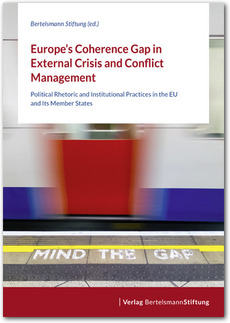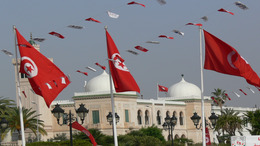It is already foreseeable that the corona pandemic will exacerbate existing undesirable developments - not least in good governance and economic development - and further fuel conflicts in the crisis-ridden countries of the EU neighbourhood. With less financial resources available, governments in the EU are accordingly confronted more urgently than ever before with the need to organise their cooperation internally and externally in such a way that solo efforts and silo thinking are overcome in favour of holistic, so-called "Whole-of-Government" approaches to crisis management. At EU level, this should at best result in a "Whole-of-Europe" approach.
It is now recognised that external intervention can only be successful if first and foremost the instruments of diplomacy, development cooperation and security, which have hitherto been used largely independently of each other, are better coordinated and transformed into a coherent policy. After all, development can only take place in a secure environment as, vice versa, security cannot be guaranteed without corresponding state, social and economic development. Given the complexity of the challenges involved, there is therefore a need for institutional coordination far beyond the traditional ministries of foreign affairs, defence and development cooperation that are concerned with foreign and security policy. Today, environmental, climate and health issues play a decisive role in crisis prevention and management, as do problems of the rule of law, anti-corruption, gender justice, trade and finance policy, and require the involvement of the expertise and instruments of the ministries concerned.
The fact that no country is an island any more has been demonstrated not least by the refugee crisis in Europe in 2015. The many trouble spots and conflicts in the EU's neighbourhood could not and do not allow themselves to be excluded, but rather have an impact on the EU. It is therefore in the EU's own interest that it should become involved in this region. Unfortunately, the record of the EU and its member states in crisis and conflict management is not satisfactory. This is demonstrated by the continuing civil wars in Afghanistan, the Congo, Libya, Syria, the Sahel and Yemen. The influence of the EU in its neighbourhood to ensure a peaceful transformation towards democracy and a social market economy has also fallen far short of expectations.
The 29 reports in this book - one for each EU member state and one on the EU as a whole - examine for the first time whether and how steep the learning curve in the development of Whole-of-Government strategies actually was and, accordingly, how successfully new forms of cooperation between the various actors in external crisis and conflict management and within and between their institutions and organisations were put into practice.
The "best practices" of institutional reorganisation identified in this process are intended to motivate governments to make further reform efforts in inter-institutional cooperation. They can also provide illustrative material in the Corona crisis on how things can and should be done better. Finally, it is clear that health issues, at least in this category, also have a high-grade security policy dimension. In their economic dimension, they do not only threaten social peace and thus political stability within the country, but also lead to new distributional conflicts at the intergovernmental level and thus to further tensions with an as yet uncertain outcome for the EU and international relations.





![[Translate to English:] Bildmontage - Weizenfeld, auf das die tunesische Flagge projiziert wurde](/fileadmin/files/_processed_/9/4/csm_286567047AdobeStock_361654509_KONZERN_ST-EZ_bearb_71cbd89aa7.jpg)




